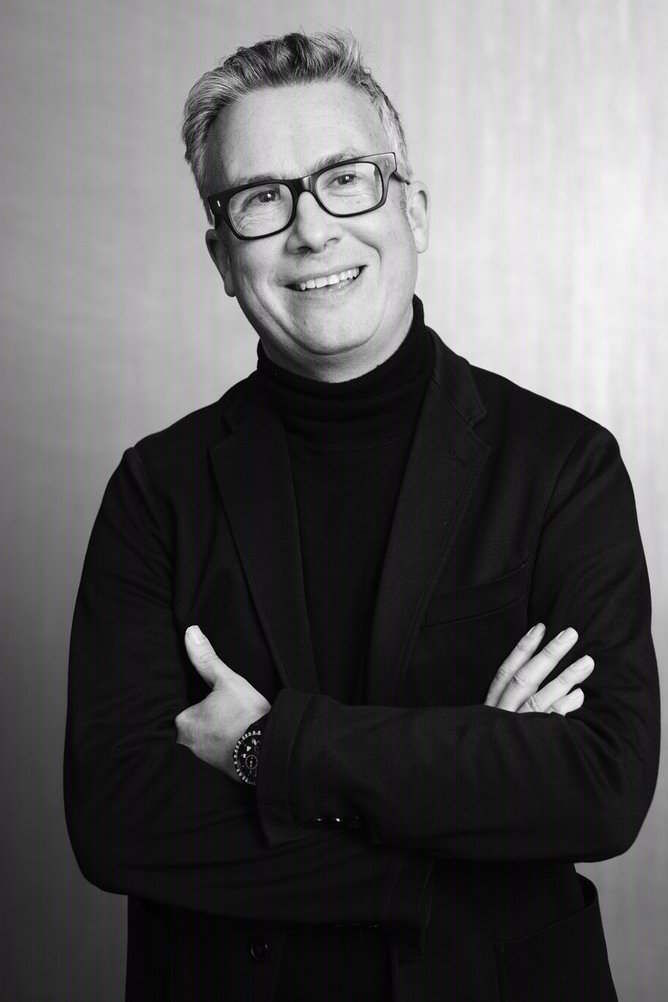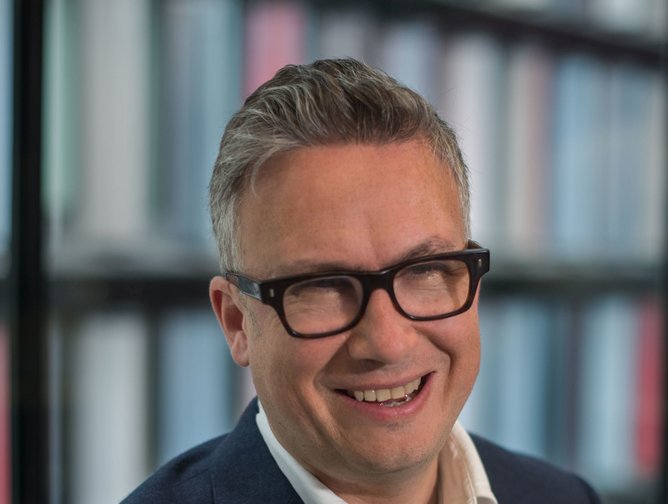First-ever LGBT business champion Iain Anderson is a leader

This article is the unabridged version of the feature in the March 2022 edition of Sustainability Magazine.
The UK government made history in in September 2021 when it appointed Iain Anderson, the Founder and Executive Chairman of global communications firm Cicero/AMO, as its first-ever business champion
Sustainability Magazine spoke with Iain Anderson for an in-depth discussion on the state of LGBTQ+ acceptance at work, how the business world can affect change and the efforts he has been involved in.
Blaise Hope: Hi Iain, great to meet you. So tell us who you are and your journey to today.
Iain Anderson: Great. I'm Iain Anderson. I am the UK’s first ever LGBT business champion and I also chair Cicero/AMO, which is a leading public policy research and communications business, and the business is sort of the sum of many of my parts. I started off as a business journalist. I've covered corporate and economic issues in some way, shape or form all of my life. I've worked with business and political leaders, including a bit with [ex-UK Home Secretary and now-House of Lords peer] Ken Clarke and never had so much curry or listened to so much jazz.
I launched my business about 20 years ago and work with corporates large and small, domestic and global across a range of sectors. I'm probably best known for working in and around the financial services and FinTech sector, but my business now works across virtually every part of the economy. If you cut me in half, which is a rather strange idea, I would say Ian likes being part of the debate. I have been very much involved in LGBTQ activism for about the past five or six years.
I'm a Stonewall ambassador. I am a trustee of the global giving charity GiveOUT and at the University of St. Andrews I am on their diversity assurance group to ensure St. Andrews remains world-leading in every sense. If you look at me, it's business, economics, diversity, and social action.
BH: Sustainability is now firmly on the corporate agenda and diversity and inclusion goes into that. It is now even part of planning recruitment. You don't even need to get people to agree with it, it's a no-brainer.
IA: This is why I was so keen to take you up on your offer. One of the things I'm trying to do is move this conversation from, purely the diversity and inclusion piece into the ESG conversation. For it to be a meaningful part of what corporates do around the 'S' of ESG.
BH: What was the process of you finding out that you were going to be appointed before and immediately after?
IA: I think the best way of describing it is that I probably talked myself into this job. It's an unpaid role and I very much do do the day job still. But it's a role that came about in the spring of 2021. I was hearing about some of the initiatives the government had planned, not least the plan to have a global LGBT conference bringing together lots of kind governments and policymakers. Two things struck me: the first was that nobody was really talking about the role of business. They were talking about political actors, civil society, actors, and, actually, businesses and the workplace is where most people spend most of their time. Surely building in that fact is an important thing to do.
The second, and this goes back to your first question, is that most of my career as we built Cicero from the ground up, has effectively been operating an SME. Just before the pandemic hit, we sold a majority stake of the business to the global communications group Havas, which is part of [French media conglomerate] Vivendi. So I'm now part of a very large global business with a lot of power and strength.
Therefore, I have seen the opportunities and challenges as an SME and now see the opportunities and challenges for larger businesses. Out of that, I thought, why is this conversation always about large corporates and 50% of the time people are working in small businesses, in smaller organisations? From that I chaired the first-ever conversation hosted by the then-Minister for Women and Equalities [Rt Hon Elizabeth Truss MP] and myself, that focused on supporting SMEs on LGBT at work.
In the summer of 2021 the government turned to me and said, “look, actually that was quite an interesting initiative. Would you like to take on this role as a business champion to shine a light on best practise and try to get large and small businesses collaborating? To go out and find some evidence to enable greater LGBT progress at work.
BH: You came in at a time when members of an LGBT panel had walked out, they thought the government wasn't taking it seriously. I'm just curious, what situation did you feel like you were walking into?
IA: You make a good point to emphasise. I'm not a government minister, I don't make policy and questions around policy are for elected officials. The government had an LGBT advisory panel and decided, from a policy perspective, that it wanted to go into a new format there. It appointed [Lord] Nick Herbert as the government’s lead LGBT advisor and wanted to focus on business. Directly to your question, you know, what I'm trying to do is reach out to not just businesses, but also through my links and my commitment to LGBT activism to reach out to charities that are involved in this sector to reach out to the trade unions that have an interest, to find out and inform policy.
The really surprising thing for me has been that the government has a lot of data on gender at work, on ethnicity at work, on social mobility at work, but what it doesn't have is a lot of data on LGBTQ at work. I'm basically going out and about trying to get data to help make better informed policy.

BH: What lessons do you think are here for other governments trying to do the same thing?
IA: I think the exciting thing about this is it is the first time a government has appointed an LGBT business champion. This for me goes far beyond the classic diversity and inclusion piece. The last two years has accelerated the question around how businesses are operating in society.
I remember doing a conference in November 2019 when the topic was, ‘would environmental and social and governance [ESG] factors survive a cyclical downturn?’ Well, we haven't had a cyclical downturn. We've had a global pandemic that has unleashed a very legitimate conversation about the role we all play in society and the role that business plays in society. So one of the things I'm trying to do out of this, and hopefully we'll see this replicated in other countries, as well, is to take some of this conversation out of purely being DEI and turning it into a meaningful, tangible element around the S part of ESG. It also has a bearing on the E and G parts of ESG, but S is where investors are trying to lock in long term meaningful change.
BH: I was going to now go straight in, and say ‘let's talk about corporates’, but I feel we should talk about investors first. That's a really interesting phrase ‘locking in the long term change’ through investors. Can you expand on that?
IA: If we look at what some of the major public pension schemes are now asking for, the Californian teachers or the Norwegian sovereign wealth fund, some of the biggest investors in the world. They are now asking very, very, very different questions than they were a decade ago, but they're certainly asking about corporate behaviour, intentions, what's happening with supply chains. We had one major Wall Street investor ask us to present two years ago and 15% of the score in the initial tendering process was to provide evidence on your approach towards diversity and inclusion.
That question was about evidence, as opposed to ‘tell us about your commitment’. It was a hard question. It was a new question. It was an unexpected question, but I think it was a result of that major Wall Street name, trying to move its supply chain faster than it could move itself. I've only seen those sorts of questions grow in terms of importance now that they're regularly on the tenders that come from major institutions.
One of the most depressing telephone calls I would occasionally take pre-pandemic, is about a month away from a Pride March in London or in New York or wherever, and the corporate is saying to me, ‘Should we be on the Pride March this year?’ I would say, ‘Well, possibly, but what are you actually doing? What are you actually doing to make work better for LGBTQ+ people?’ And if the answer to that was rather hollow I tend to say to that organisation, ‘I think you need to look yourself in the mirror here before you start on the Pride March trying to wave that flag’, because increasingly - and rightly - investors, politicians, and now the regulators are posing some harder questions.
BH: That’s a change you are seeing and hearing from everywhere. You can't get away with a hollow commitment anymore. People are wise to it, it's hit the point of momentum where everybody from the Norwegian sovereign wealth fund to a medium sized startup seems to be tackling the same issue at the same time. Pre-2022, how would you characterise the state of affairs for LGBTQ+ people in the workplace and within corporate culture as a whole?
IA: So I think the difficulty in your question, is the, ‘as a whole’ bit. There are certain sectors of the economy that are doing pretty trailblazing work. I've come across a bank that has an amazing policy to support trans people, a major telecoms company, too, where they will step in with their private healthcare support at the point of medical transition. I've seen amazing examples where companies are trying to bring together the LGBTQ vote and allies.
The really important bit is to ensure this is not just happening at head office, that it is being embedded throughout the company. But I'm seeing other parts of the economy and other sectors. It's just harder. There's not a conversation going on. I was sitting next to a very progressive car manufacturer just before Christmas, who's actually putting in place ally programmes, employee resource groups, thinking about healthcare offers to LGBTQ+ workers, thinking about childcare support and all these elements. At the same time they were very candid that in their workplace there's still quite a lot to do in terms of prejudice.
There's still quite a lot to do in terms of an everyday feeling that people can be themselves. Sometimes they still need to compartmentalise those conversations with folks who are willing, and warm, and who are allies. In some other parts of the business that's just not happening. So it is very much a work in progress. It's also very different in different sectors, and that's informing one of the things that I am trying to achieve.
The first is that we are able to hopefully meet much more in person, in a series of roundtables around the UK with various parts of the economy. We’re going to go see oil and gas, manufacturing, retail, financial and professional services, just to find out where people are because I just don't think the ‘as a whole’ point is necessarily what's happening out there. I think different parts of the economy are going at very different speeds on this.
BH: Do you see change as more tied to generational shifts? Do you sense an organic desire in the corporate world?
I think it's a bit of both. I think it's a bit of push and pull. I think the kind of questions that are coming from younger folk in the workplace are demanding more change. So I do think it's a bit like my earlier point about investors and - let's face it - generational changes that are being aggregated in terms of how people are saving for their long term future and the kind of questions younger investors are asking were just not being asked by their parents. But I have seen a mindset change at board level, too.
I do think more and more companies understand and the heartening thing is they seem to understand that for global companies there's an opportunity to affect change through their supply chains and where they operate, and sometimes where they operate is in places that are not safe for LGBTQ+ people. I mean, some territories where, we've got to be honest, you could be thrown off a building for being gay and face no consequences. In fact, you could be applauded by certain sections of society. So, there's been some pretty groundbreaking work with some organisations to create and make work a very safe place to be.
I’ve often heard the phrase that work is the place where people feel safest to be themselves. It’s something Nick Herbert is working on is if we can support some governments in the 70 or so countries that still have legislation where it's illegal to be LGBTQ+ or there are severe restrictions on your life, or there's inherent embedded prejudice around you being you, that we use diplomatic efforts in order to try and shift some of those territories into a much better place. That might be done quietly rather than noisily, but that's a good thing to try and achieve here. I do think business has a big part to play as you know, in those conversations, not least because businesses are talking to governments a lot about where they locate, where they invest, and those conversations carry both hard and soft economic power. There's a way of bringing these conversations together to affect social change.

BH: Can you tell me more about your work with Lord Herbert and also initiatives, especially Safe to Be Me and LGBT At Work?
So working a lot with, with, with Nick Herbert as he's working at a macro intra-governmental level. His work with the caucus of parliamentarians around the world to seek and secure LGBTQ rights is well-known. He's very instrumental in joining up the dots. My role is to support his work but to bring that business element, to bring that business voice to be able to join the dots in some of the wider efforts. Nick is leading the initiative for the first global LGBT conference which takes place on June 27-29 this year, around the 50th anniversary of the first Pride March in the UK [Pride in London first held on July 1, 1972].
It is going to have four major commitments. The first is packing together governments into commitments for securing greater progress for LGBTQ+ people. For example, there are plans on banning conversion therapy in Canada, plans in France, plans in the UK, packing together lots of international commitments. Second, looking to secure some of the change I was referring to earlier, is trying to move some of the 70 or so states that are on the wrong side of history on this one, onto the right side of history. There's a lot of diplomatic work taking place on the third, which is to secure commitments from many governments around access to public services for LGBTQ+ people, particularly around public health services.
The final one, this is the bit I'm most actively engaged in, is the Safe to Be Me conference from June 29-July 1. Getting business commitments to create a specific sort of business declaration that will get businesses signing up to at least the UN principles on LGBTQ+ rights. I've got an ambition to write in specific commitments to get large and small businesses working together, back to my earlier theme that we work in commitments around supply chains, that we don't reinvent the wheel, but we actually make the wheel a bit bigger. We get more people signing up to this and not just for a deck but with actual tangible commitments.
BH: What do you hope to accomplish as a legacy of what you're doing?
First, a commitment to equality. We made a commitment to an LGBTQ+ network here in the UK as a long term thing. That's why I'm so keen to link this into the current debate around ESG, a meaningful and tangible thing that businesses can do around the social part of ESG. So that this is locked in.
The second thing is to move slightly beyond where we've been, since a lot of this conversation has taken place around large companies. I don't think enough attention has been there from the government, from the LGBTQ+ civil society movement, on what smaller organisations can do. I really feel passionate about this. If we can get larger and smaller organisations collaborating together for progress in the workplace for LGBTQ+ people, that would be great. Right now, about 20% of LGBTQ+ people in the UK do not feel they can be out at work. We've got to try to drive that number as low as we possibly can.
BH: Iain Anderson, thank you very much.






